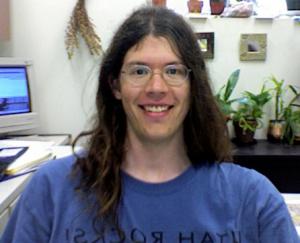
Office Location:
Specialization:
Area of Research:
Cambrian paleontology and biostratigraphy
Education:
PhD Fall 2013
Thesis/Dissertation
“Studies on Cambrian Small Shelly Fossils”
Advisor
Susannah Porter
Bio:
Award(s)
UCSB Regents Special Fellowship, 2007/08 & 2010/11
G.K. Gilbert Award, 2011/12
Research:
I'm a post-doc working with Prof. Susannah Porter. The oldest diverse communities of animals with skeletal hard parts were found in the Cambrian Period, beginning around 541 million years ago. The remains of these creatures are affectionately termed the small shelly fossils—a variety of spines, shells, plates, and tubes that can occur in great profusion in rocks from this time. Certain of these fossils may be recognized as the earliest representatives of major groups that still exist today, but many remain enigmatic, often representing long-extinct groups of bizarre appearance. I am studying several of these more problematic forms in an attempt to learn what these animals were like and how they fit into the evolutionary tree of life. Fossils I'm looking at come from China, Australia, and the United States; they include chancelloriids (animals that lived on the seafloor and were covered with tiny rosettes of spines, so that they looked something like barrel cacti), hyoliths (conical fossils that may or may not be related to molluscs), and other creatures even more obscure.
Publications:
- J.L. Moore, S.M. Porter, M. Steiner, & G.-X. Li. 2010. Cambrothyra ampulliformis, an unusual coeloscleritophoran from the Lower Cambrian of Shaanxi Province, China. Journal of Paleontology 84: 1040–1060.
- A.C. Maloof, S.M. Porter, J.L. Moore, F.Ö. Dudás, S.A. Bowring, D.A. Fike, J.A. Higgins, & M.P. Eddy. 2010. The earliest Cambrian diversification of animals and ocean geochemical change. Geological Society of America Bulletin 122: 1731–1774.
Courses:
Earth 2: Physical Geology (Teaching Assistant), F09
Earth 7: Dinosaurs (Head Teaching Assistant), S08/S09/S10/F10/F11/F12
Earth 20: Geological Catastrophes (Teaching Assistant), F08
Earth 111L/ EEMB 136L: Intro to Paleontology (Teaching Assistant), W09/W10/W11/W12
Earth 143: Early Evolution of Life and its Environmental Context (Teaching Assistant), S11
